Розробка уроку з англійської мови у 7 класі «Cooking»
Розробка уроку з англійської мови у 7 класі «Cooking»
Підготувала Калінцова В.В., вчитель англійської та німецької мови КЗ «Зорянська загальноосвітня школа І-ІІІ ступенів Нікольської районної ради Донецької області
Theme: Cooking
Aims: 1.To enrich pupils’ vocabulary on the topic.
2. To encourage pupils’ creative skills and responsibility.
3. To develop listening, reading, writing comprehension skills, critical thinking.
4. To open the pupils’ mind.
5. To cultivate in pupils an interest in learning English, British cooking traditions.
Equipment: video “Window on Britain. Food”, CD, presentations, cards, puzzles.
Procedure
Teacher: Good morning, children! I’m glad to see you! How are you?
Today we shall continue to speak about doing chores. Everyone must do his or her part of chores; children must help their parents about the house too. What do you usually do about the house? One of the main points of house holding is preparing meals. Now let’s revise “The Cooking Poem”
When you're cooking in the kitchen,
You're learning all the while --
To pour and measure, mix and mash
And sift flour into a pile.
Wash your hands before you start,
Then gather up the gear --
Like pots and pans and measuring cups
That you use throughout the year.
Go over the recipe, step-by-step
So you'll know just what to do.
By carefully following the directions
It won't be hard for you.
(Pupils repeat the poem)
T: Now I want you to complete the sentences according to the poem and read it
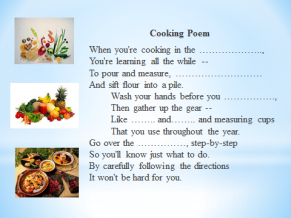
(slide 1)
T: To know the theme of our lesson I’d like you to do the crossword (slide 2)
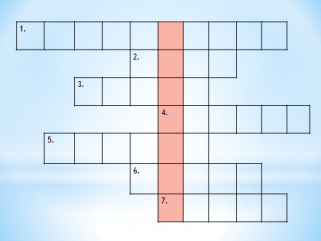 1. A thing we spread on the table
1. A thing we spread on the table
2. A thing we eat salad with
3. A thing we eat soup with
4. We boil water in it
5. We can clean hands with it during the meals
6. We can cut with it
7. We can drink water of it
So you can see that today we shall speak about one of the chores – the cooking. By the way where do people usually do cooking? Who does the cooking in your family? I hope you help your Mums to cook meals. Your home task for today was to prepare presentations with the recipes of your favourite dishes.
(Pupils present their homework)
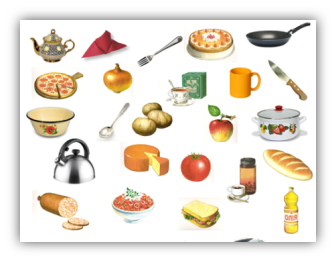 T: Very good! Now we'll see how attentive you are. You will work in groups. You must look at the pictures attentively for one minute and try to remember them. Then you will have two minutes to write what you have seen. We’ll see which group is the most attentive (slide 3)
T: Very good! Now we'll see how attentive you are. You will work in groups. You must look at the pictures attentively for one minute and try to remember them. Then you will have two minutes to write what you have seen. We’ll see which group is the most attentive (slide 3)
T: We can use all these to do the cooking. To continue our work you should learn some new words (slide 4)
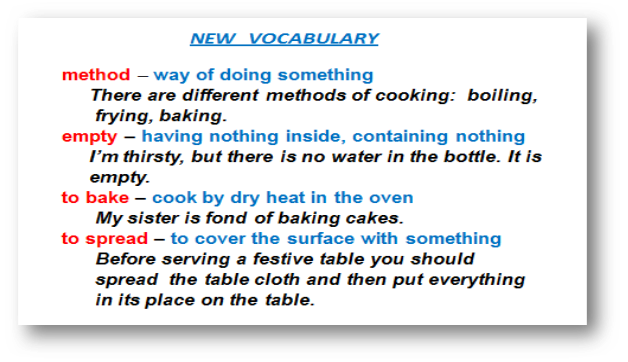
T: By the way what cooking methods do you know? What is the difference between a glass of wine and a wineglass? Now you will listen to the part of TV show and do the task of ex.2 on page 61.
(Pupils listen to the record and complete the sentences according to the text)
T: Well done. We shall continue to get acquainted with the life of British people, their meals, likes and dislikes. Now you will watch a film about British meals and then I shall remind you some facts from the film but with mistakes and you should find them and correct (Window on Britain “Food”)
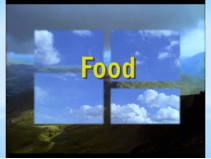 1. Milkman brings milk usually before dinner (before breakfast)
1. Milkman brings milk usually before dinner (before breakfast)
2. Mr Robinson prefers toasts with jam or marmalade (bacon, egg, sausage, tomato and fried bread)
3. Lunch is about one or two o’clock (about 12 or 1 o’clock)
4. Dinner is usually at 7 o’clock.
5. Britain has only British restaurants (a lot of foreign)
6. British traditional food is sausages and pasta.
T: Next task you will do in groups. You will have the text to work with. The first pupil from the group will go to the blackboard with the questions, read it and tell it to the second member of the group. The second pupil should write it down. The other pupils should find the answer in the text. You will have three minutes to do the task. We’ll see which of the teams will work better.
Meals and Cooking
The usual meals in England are breakfast, lunch, tea and dinner or, in simpler houses, breakfast, dinner, tea and supper.
For breakfast English people mostly have porridge or corn-flakes with milk or cream and sugar, bacon and eggs, marmalade with buttered toast and tea or coffee. For a change they can have a boiled egg, cold ham, or fish.
English people generally have lunch about one o'clock. At lunch time in a London restaurant one usually finds a mutton chop, or steak and chips, or cold meat or fish with potatoes and salad, then a pudding or fruit to follow.
Afternoon tea can hardly be called a meal. It is a substantial meal only in well-to-do families. It is between five and six o'clock. It is rather a sociable sort of thing, as friends often come in then for a chat while they have their cup of tea, cake or biscuit.
In some houses dinner is the biggest meal of the day. But in great many English homes, the midday meal is the chief one of the day, and in the evening there is usually a much simpler supper — an omelette, or sausages, sometimes bacon and eggs and sometimes just bread and cheese, a cup of coffee or cocoa and fruit.
1. What are usual meals in England?
2. What do the English people have for breakfast?
3. When do they have lunch?
4. What is their biggest meal of the day?
T: The last task is to do puzzles. You are to restore the text of recipe and guess what dish it is. If you do puzzle correctly you will get the picture of it.
(Pupils do the puzzles)
T: Let’s summarise the results of our lesson. Did you enjoy our lesson? What new have you learnt?
Калінцова В.В., учитель англійської мови
КЗ «Зорянська загальноосвітня школа І-ІІІ ступенів Нікольської районної ради Донецької області»


про публікацію авторської розробки
Додати розробку
